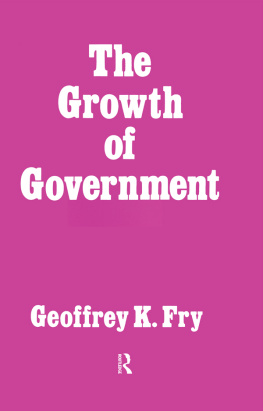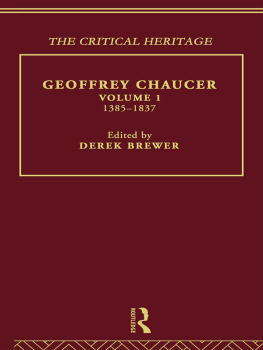The Growth of Government
By the same author
Statesmen in Disguise
First published 1979 in Great Britain by
Frank Cass and Company Limited
Published 2019 by Routledge
2 Park Square, Milton Park, Abingdon, Oxon, OX14 4RN
52 Vanderbilt Avenue, New York, NY 10017
Routledge is an imprint of the Taylor & Francis Group, an informa business
Copyright 1979 Geoffrey K Fry
All rights reserved. No part of this book may be reprinted or reproduced or utilised in any form or by any electronic, mechanical, or other means, now known or hereafter invented, including photocopying and recording, or in any information storage or retrieval system, without permission in writing from the publishers.
Notice:
Product or corporate names may be trademarks or registered trademarks, and are used only for identification and explanation without intent to infringe.
British Library Cataloguing in Publication Data
Fry, Geoffrey Kingdon
The growth of government.
1. Great Britain Politics and government 17601820
2. Great Britain Politics and government 19th century
3. Great Britain Politics and government 20th century
354.410009 JN210
ISBN 13: 978-0-7146-3116-5 (hbk)
To My Wife
This is an historical study of the growth of government in Britain. It was begun in 1970, and that is the point down to which the study is really taken. The most recent developments in government necessarily receive only limited attention, and the author hopes to publish separately a fuller study of administrative change in Britain since the 1950s. God willing, I hope to follow the present book with another historical study, this time about why the role of government changed, a convincing explanation of which requires more comparative work to be done.
The present book is derived from a much larger manuscript. The original manuscript covered the period from 1485 and included material about the machinery of government down to 1780, and a detailed history of the changing functions of the State in the economy and in social provision. To keep the book within the bounds of economic viability the above-mentioned material has been discarded.
Multi-disciplinary work of the kind that this book is based on is difficult to sustain without help and encouragement from others. Almost all of this support has come from serving or former members of the staff of the University of Leeds: Maurice Beresford, Forrest Capie, Doreen Collins, Christie Davies, Alan Deacon, Heather Fry, Justin Grossman, Harry Hanson, Owen Hartley, Harold Hillman, Maurice Kirk, James Macdonald, Peter Sedgwick, Harold Seidman, and Dennis Warwick. I am indebted also to Jindrich Veverka and Nevil Johnson. When I say that none of these scholars can bear any responsibility for what appears in this book I am not being merely formal. Their views are not my views. I am responsible for the contents of this book.
The staff of the Brotherton Library at Leeds, and particularly of its Inter-Library Loan Service, were very helpful in locating the literature for this book. I am especially grateful to Jenny Cooksey, Yvonne Fennell, Tim Hargreave, Anne Reed, Hugh Wellesley-Smith and Ruth Taylor. To the extent that the literature was from government sources, I am grateful to the Controller of Her Majestys Stationery Office for general permission to quote from its published material.
The Select Bibliography means what it says. It contains a selection of the works that I have found most useful in writing this book. I have largely left out the material contained in the extensive bibliography of my earlier book, Statesmen in Disguise , including government paper.
I take this opportunity too of thanking Alex Robson for her excellent typing of the manuscript, and Janet Brown for her meticulous proof reading.
This book is dedicated to my wife, Heather Fry, whose idea it was, and without whom it would never have been completed.
March 1978
G K FRY
Chapter 1
The Growth of Government
What should government do? Few would dispute governmental responsibility for such functions as the maintenance of internal law and order, and also of external defence and the conduct of foreign policy. Controversy over the role of the State is chiefly concerned with its functions in relation to the economy and social welfare. Should government abstain from interference in the economy as much as possible? Should it control the economy? Should it manage the economy, whilst leaving most of it in private ownership? Should the State leave social provision mainly to individuals and groups, or should it dominate such provision itself?
Since the time of Adam Smith, liberalism has provided most of the British answers to these questions. Liberalism was for long the British ideology. The Labour victory in that Election seemed to confirm a new order. The Positive State or the Managed Economy Welfare State, which was mainly constructed in the period during and immediately after the Second World War, was the creation of Conservative and Fabian as well as liberal ideas and action. Yet, the Fabians claimed it for themselves. There was rough justice in this. The Fabians, after all, had come nearest to predicting what the general outlines of the new dispensation would be. They approved of its mass bureaucracies. They were the most enthusiastic for going farther, as was done in the extension of public ownership in the economy and in State social provision. By the middle of the twentieth century, the Positive State had been established with a massively extended range of economic and social welfare functions compared with those performed by government in the nineteenth century.
This book is an historical study of the growth of government which has taken place in Britain during the last two hundred years.
There is not much doubt about the general scale of governmental growth over that period, even though it is difficult to establish in detail. From the statistics which are available, it can be seen that between 1790 and 1910-when the respective figures were both 12 per cent-the proportion of the Gross National Product accounted for by public expenditure averaged about 13 per cent, and never went above 23 per cent. Since 1920, the proportion of the Gross National Product accounted for by government expenditure has never been below 24 per cent in any year. Indeed, since 1946, it has never been below 36 per cent in any year. To take another measure, the cumulative rate of increase per annum in government expenditure was 37 per cent during the period 18901961, compared with 19 per cent during the years 17901890, and 27 per cent over the whole period 17901961. This was despite the fact that the rate of population increase and the growth of the Gross National Product was slower in the period 18901961 than in the other periods. To take a further measure, the numbers in government employment probably more than doubled between 1850 and 1890 at a time when the labour force generally increased by 40 per cent. Between 1890 and 1950, while the working population rose by 57 per cent, the numbers of public employees increased by almost 1,000 per cent. The proportion of the working population accounted for by government employment increased from 24 per cent in 1850 to 36 per cent in 1890 to 243 per cent in 1950. Moreover, not only has the extent of State activity changed considerably, so has the range of governmental functions. Although the nineteenth century was one in which Britain was not involved in a major war after 1815, war related expenditure represented 449 per cent of all government spending in 1890. In 1950, halfway through a century in which there had already been two World Wars, war related expenditure represented 116 per cent of the Gross National Product compared with 4 per cent sixty years before. However, it only accounted for 297 per cent of all government expenditure. By 1950, the most important area of public expenditure had become the social services (meaning mainly public provision for education, child care, health services, national insurance, national assistance, family allowances, and housing). Between 1890 and 1950, public spending on the social services increased from 19 per cent of the Gross National Product to 18 per cent; and from 209 per cent to 461 per cent of government expenditure.













